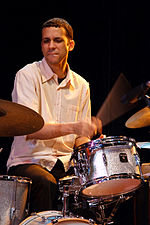Gunslinging Birds
| Gunslinging Birds | ||||
|---|---|---|---|---|
| Studio album by Mingus Big Band | ||||
|
Publication |
||||
| Label (s) | Dreyfus Jazz | |||
|
Format (s) |
CD |
|||
|
Title (number) |
9 |
|||
| occupation | ||||
|
Studio (s) |
Studio Miraval, Château de Miraval |
|||
|
||||
Gunslinging Birds is a jazz album by the Mingus Big Band that was recorded in France in mid-1994 and was released by Dreyfus Jazz in 1995 . The arrangements are by Ronnie Cuber , Steve Slagle , Gunther Schuller , Jack Walrath and Charles Mingus .
The album
The third album by the then 15-member Mingus Big Band (based on Nostalgia in Times Square in 1993) was created at the end of the Big Band's first European tour in July 1994 in Château de Miraval in Correns, southern France . The title track Gunslinging Bird with the subtitle " If Charlie Parker Were a Gunslinger There'd Be a Whole of Dead Copycats " had Mingus dedicated to the bebop saxophonist who died in 1955 and appeared for the first time in 1959 on the Mingus album Mingus Dynasty . The arrangement is by Steve Slagle, as is that of the following track, Reincarnation of a Lovebird (from the album The Clown from 1957), with Slagle (alto saxophone) and Randy Brecker (trumpet) as soloists , also reminiscent of Charlie “Bird” Parker .
OP (actually " Oscar Pettiford junior ") had Mingus dedicated to the son of the bassist Oscar Pettiford , who died in 1960 ; Craig Handy (trombone) and Chris Potter (alto saxophone) are the soloists here.
Please Don't Come Back from the Moon (also known as "Pinky") was created in the early 1960s and was played by the Mingus band u. a. played at the Town Hall Concert in October 1963. The arrangement comes from Gunther Schuller, who shortened this version slightly compared to his version on the epitaph album that was written five years earlier . Steve Slagle arranged the Mingus classic Fables of Faubus (1959); besides Slagle, the trumpeter Philip Harper is the soloist. The band adopted the original Mingus arrangement from Jump Monk , a composition from the 1950s ( Mingus at the Bohemia ) and dedicated to the pianist Thelonious Monk . The pianist Kenny Drew junior is the soloist alongside Jamal Haynes . This is followed by the medley Noon Night / Celia arranged by Ronnie Cuber . The Hog Callin 'Blues (arranged by Jack Walrath) originally comes from the Mingus album Oh Yeah ; The soloist is John Stubblefield on tenor saxophone. Also from Gunther Schuller's epitaph production from 1989 comes Started Melody , which closes the album and is based on the Vernon Duke standard I Can't Get Started (1936); As a soloist, the bassist Andy McKee and the baritone saxophonist Gary Smulyan are featured alongside Kenny Drew and Craig Handy .
Track list
- Mingus Big Band: Gunslinging Birds (Dreyfus Jazz FDM 36575-2)
- Gunslinging Birds 7:10
- Reincarnation of a Lovebird 9:53
- OP (Oscar Pettiford) 4:55
- Please Don't Come Back from the Moon (Pinky) 4:00
- Fables of Faubus 10:00
- Jump Monk 5:45
- Noon Night / Celia (Medley) 2: 30/5: 30
- Hog Callin 'Blues 8:30
- Started Melody 11:50
- All compositions are by Charles Mingus.
reception
The critics Richard Cook & Brian Morton only gave the album three out of four stars in the Penguin Guide to Jazz ; the authors particularly highlighted the version of Fables of Faubus . They have reservations about the musicians' playing, which was sharper and more precise on the previous album Nostalgia in Times Square (1993). Scott Yanow , on the other hand , gave the album 4½ (out of five) stars in Allmusic and admired the musicians' ability to master the compositions of the great bassist, which could be compared to the originals. Each of the nine titles is astonishing, both in terms of the rich ensemble performance and the solo contributions; Highlights of the album are Reincarnation of a Lovebird, Fables of Faubus (with Philip Harper and Steve Slagle), the "explosive" Hog Callin 'Blues (with John Stubblefield's highly expressive tenor) and Started Medley . The album makes it understandable why the Mingus Big Band won a number of awards for best jazz orchestra shortly afterwards.
Bill Kohlhaase praised in the Los Angeles Times that the album captured the 15-member band in top form, especially the lively, previously unbearable feeling that Mingus himself pulled out of his groups. Steve Slagle's arrangements in particular (especially in Reincarnation of a Lovebird ) may have a touch of contemporary polish that is lacking compared to the originals, but most of the nine tracks are conscientiously kept in the spirit of the namesake, right down to the Support calls from those involved.
The album was named Best Mainstream Jazz Recording in 1996 by the US National Association of Independent Record Distributors and Manufacturers .
literature
- Charles Mingus (composition), Steve Slagle (arrangement): Fables of Faubus - Series: Charles Mingus Big Band Jazz . Hal Leonard
Individual evidence
- ↑ a b Liner Notes by Sue Graham Mingus
- ↑ a b Review of Scott Yanow's Gunslinging Birds album at Allmusic (English)
- ^ Richard Cook , Brian Morton : The Penguin Guide to Jazz on CD . 6th edition. Penguin, London 2002, ISBN 0-14-051521-6 , p. 1035.
- ^ Bill Kohlhaase: Review of the album in the Los Angeles Times
- ^ Billboard, August 17, 1996

